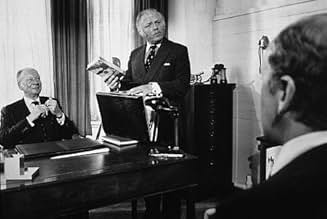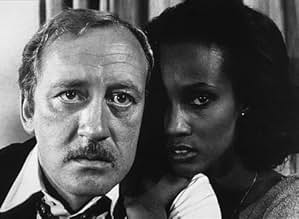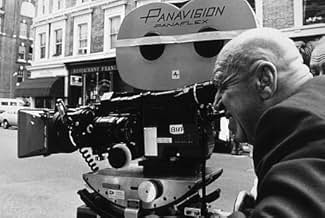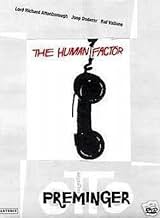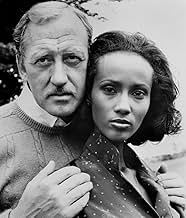AVALIAÇÃO DA IMDb
6,1/10
1,7 mil
SUA AVALIAÇÃO
Daintry é chamado para investigar um vazamento de informações da seção africana da Inteligência Britânica.Daintry é chamado para investigar um vazamento de informações da seção africana da Inteligência Britânica.Daintry é chamado para investigar um vazamento de informações da seção africana da Inteligência Britânica.
- Direção
- Roteiristas
- Artistas
- Direção
- Roteiristas
- Elenco e equipe completos
- Produção, bilheteria e muito mais no IMDbPro
Avaliações em destaque
I must confess that this was the first Otto Preminger movie I've seen, so I cannot comment it as an Otto Preminger movie, but rather just a movie among others.
I'm very much a fan of both cold war spy movies and 70/80s Great Britain, so the elements were in place for me to enjoy this. I had never heard of this (I'm yet to go through Preminger's movies) and I quite randomly picked it from the online service as it seemed pretty interesting.
And it was interesting. Very subtle and talkative, I have to say I really really liked it. The story itself wasn't too exciting, but interesting nonetheless. It's about the secret service and an apparent leak of information - possibility of double agents and so on. Very gripping, yet quite slow paced - no action. I just watched le Carre film "The Spy Who Came in from the Cold" and they are quite alike in style, altho I have to say I enjoyed this more. Even if it's not necessarily as well made, this wasn't quite as heavy-handed.
The acting is great for the most part. Nicol Williamson was a name I hadn't heard of before, but his presence really made this movie. Very understated and brilliant character, just like anyones neighbor or work colleague. There's a weak link too unfortunately and that's Iman, she's horribly wooden and unnatural in her acting most of the time.
I'm dropping one point because of sloppy cinematography too - lighting in particular and a few shots that look really staged. I'm not sure why some scenes were so horribly set up, the lights almost looked as if they just flipped a few spotlights over and pointed them at actors faces.
Despite these few flaws, it's a really enjoyable spy movie for anyone into cold war spy stories in style of le Carre etc. Grab a whisky and time machine yourself back into cold war era. This doesn't seem to be too well distributed tho so it may be a bit hard to find.
I'm very much a fan of both cold war spy movies and 70/80s Great Britain, so the elements were in place for me to enjoy this. I had never heard of this (I'm yet to go through Preminger's movies) and I quite randomly picked it from the online service as it seemed pretty interesting.
And it was interesting. Very subtle and talkative, I have to say I really really liked it. The story itself wasn't too exciting, but interesting nonetheless. It's about the secret service and an apparent leak of information - possibility of double agents and so on. Very gripping, yet quite slow paced - no action. I just watched le Carre film "The Spy Who Came in from the Cold" and they are quite alike in style, altho I have to say I enjoyed this more. Even if it's not necessarily as well made, this wasn't quite as heavy-handed.
The acting is great for the most part. Nicol Williamson was a name I hadn't heard of before, but his presence really made this movie. Very understated and brilliant character, just like anyones neighbor or work colleague. There's a weak link too unfortunately and that's Iman, she's horribly wooden and unnatural in her acting most of the time.
I'm dropping one point because of sloppy cinematography too - lighting in particular and a few shots that look really staged. I'm not sure why some scenes were so horribly set up, the lights almost looked as if they just flipped a few spotlights over and pointed them at actors faces.
Despite these few flaws, it's a really enjoyable spy movie for anyone into cold war spy stories in style of le Carre etc. Grab a whisky and time machine yourself back into cold war era. This doesn't seem to be too well distributed tho so it may be a bit hard to find.
This is an odd film. 'Low-key' is certainly an apt description, and though I don't agree, I can see why some have dismissed it as flat, tedious, etc.
It has stayed in my mind after each viewing - I've seen it twice now on television - more than many other more critically praised films. There's something about the deliberate underplaying, the bland, familiar suburbia of the leading character's house, the politeness, the dog.... The film shows us a non-dramatic world in which dramatic events are being played out in secret, under cover of banal normality. It recalls the hurried departures of Kim Philby and friends from their own domestic lives. It's unsettling: what else might be happening in our own quiet streets?
Personally, I think it's rather wonderful. Clearly it's an ancestor of the brilliant TV adaptations of Le Carre; indeed, it feels more like Le Carre than Greene, which may be why Greene reportedly didn't like it. But it needs to be viewed for what it is: an essay in tension, told in a deliberately chosen style. If you only like action films, it's not for you.
It has stayed in my mind after each viewing - I've seen it twice now on television - more than many other more critically praised films. There's something about the deliberate underplaying, the bland, familiar suburbia of the leading character's house, the politeness, the dog.... The film shows us a non-dramatic world in which dramatic events are being played out in secret, under cover of banal normality. It recalls the hurried departures of Kim Philby and friends from their own domestic lives. It's unsettling: what else might be happening in our own quiet streets?
Personally, I think it's rather wonderful. Clearly it's an ancestor of the brilliant TV adaptations of Le Carre; indeed, it feels more like Le Carre than Greene, which may be why Greene reportedly didn't like it. But it needs to be viewed for what it is: an essay in tension, told in a deliberately chosen style. If you only like action films, it's not for you.
Tom Stoppard's adaptation, and Preminger's direction, seem to have produced a stylish and grown-up filmed interpretation of Greene's sardonic yet moving condemnation of the cruelty of the Cold-War, during which both the Left and the Right have forgotten 'The Human Factor.'
Both the West and the Soviets are portrayed as they execute a risibly elephantine yet humanly appalling dance of death over the crushed lives of ordinary, decent people.
This remarkably accomplished and understated politico/moral thriller is a far more effective translation of an immeasurably greater book than is the more recent film of John Le Carre's original novel of 'The Tailor of Panama.' The latter film in particular entirely fudges the politics of Noriega's Panama, and the United States' role therein. Preminger's film, by contrast, is amazingly honest and balanced, for its period, about the protagonists of the fraught global struggle of its time. In this it is faithful to Greene's intentions.
No doubt the earlier film was critically sunk by its evident contempt for the received political 'wisdom' of its age. And by its willingness to entertain the possibility that the 'democratic' West could quite easily countenance Nazi-style medical research, both for the removal of inconvenient individuals like the wretched Davis, and for sale to strategic allies like apartheid-era South Africa in the form of a poison gas 'cordon sanitaire' between them and black Africa. Certainly, even the best American reviews (which always heavily preponderate on this Website), while they 'condemn with faint praise,' studiedly avoid any mention of the political and moral core of the film. This is to circumvent, and to radically subvert, the integrity of a serious work.
However, anyone who has actually grown up since then should enjoy and appreciate this rather brilliant - if neglected - film version of a Grahame Greene classic: Script, performances, design and filming are uniformly excellent. It is far, far more than a spy-thriller. Greene's original is faithfully followed into areas that Le Carre merely touches upon.
Special praise and thanks, therefore, to BBC4's original and brave choice to programme it on their new British channel, recently! Naturally, it is not commercially available in Britain. American capitalism, however - to its partial credit! - is capable of allowing this film to exist at least as a product, relying on dialectical hostility to effectively police the public's exposure to such an evidently heretical viewpoint! Sufficient numbers of people will always helpfully parrot the 'official line' that is peddled by our cultural 'commissars' in order to prevent such views spreading in the wildfire manner which a truly free exchange of ideas would permit. Their critical contempt for the viewing public is obviously justified, I regret to say.
Both the West and the Soviets are portrayed as they execute a risibly elephantine yet humanly appalling dance of death over the crushed lives of ordinary, decent people.
This remarkably accomplished and understated politico/moral thriller is a far more effective translation of an immeasurably greater book than is the more recent film of John Le Carre's original novel of 'The Tailor of Panama.' The latter film in particular entirely fudges the politics of Noriega's Panama, and the United States' role therein. Preminger's film, by contrast, is amazingly honest and balanced, for its period, about the protagonists of the fraught global struggle of its time. In this it is faithful to Greene's intentions.
No doubt the earlier film was critically sunk by its evident contempt for the received political 'wisdom' of its age. And by its willingness to entertain the possibility that the 'democratic' West could quite easily countenance Nazi-style medical research, both for the removal of inconvenient individuals like the wretched Davis, and for sale to strategic allies like apartheid-era South Africa in the form of a poison gas 'cordon sanitaire' between them and black Africa. Certainly, even the best American reviews (which always heavily preponderate on this Website), while they 'condemn with faint praise,' studiedly avoid any mention of the political and moral core of the film. This is to circumvent, and to radically subvert, the integrity of a serious work.
However, anyone who has actually grown up since then should enjoy and appreciate this rather brilliant - if neglected - film version of a Grahame Greene classic: Script, performances, design and filming are uniformly excellent. It is far, far more than a spy-thriller. Greene's original is faithfully followed into areas that Le Carre merely touches upon.
Special praise and thanks, therefore, to BBC4's original and brave choice to programme it on their new British channel, recently! Naturally, it is not commercially available in Britain. American capitalism, however - to its partial credit! - is capable of allowing this film to exist at least as a product, relying on dialectical hostility to effectively police the public's exposure to such an evidently heretical viewpoint! Sufficient numbers of people will always helpfully parrot the 'official line' that is peddled by our cultural 'commissars' in order to prevent such views spreading in the wildfire manner which a truly free exchange of ideas would permit. Their critical contempt for the viewing public is obviously justified, I regret to say.
The picture concerns the world of secrets agents and spies . Unexciting spy caper has a leak of information in the African section of British Intelligence , as a British Service agent betraying his country in order to aid a woman and a friend . The high-command fears he may be the leak to Moscow, and schemes to stop the damage permanently . Then Security man Daintry is brought in to investigate. As a result of his actions an innocent man is condemned to a fatal fate . Things go wrong when the responsible person is discovered and is forced to defect . Every man in love is a potential traitor !.
This interesting but low-key movie is a cold thriller plenty of suspense , mystery , plot twists , tension and top cast . The prospect of Tom Stoppard rendition a Graham Greene novel promises more than movie really offers , though darkly ironic tale of Foreign Office treason still throws up delights and twisted surprises . The casting is first-rate with a top-notch star-studded , including script by prestigious Tom Stoppard , though results are average. As the bulk of the formidable cast is pleasantly familiar in this engaging if slow-moving drama , including the following ones : Richard Attenborough , John Gielgud , Derek Jacobi , Robert Morley, Ann Todd , Richard Vernon , Tony Vogel , Fiona Fullerton, Adrienne Corri , Martin Benson . And no fault of the always splendid Nicol Williamson as a British double agent who is forced to defect to Russia , though he's billed eight in order alphabetic , but quite clearly has the central part , and surprisingly the gorgeous model Iman , David Bowie's wife, resulting to be an acting discovery by providing an nice performance.
Based on the novel by Graham Greene , almost all of his novels and five plays -including "Brighton Rock", "The Ministry of Fear" and "The End of the Affair"- , have been brought to the screen. A superb storyteller, he also wrote the screenplays for such classics as The fallen idol (1948) and The Third Man (1949). The flick belongs to spies sub-genre developed during ¨Cold war¨ and its maxim representations are John LeCarre's novels rendered to cinema in movies as ¨The spy who came in from cold¨ (by Martin Ritt with Richard Burton) , ¨The Kremlin Letter¨(John Huston with Nigel Green) and ¨Russia House¨(Fred Schepisi with Sean Connery) , these films get similar atmosphere and twisted intrigues about spies among East and west World but with no relation to spies from James Bond novels by Ian Fleming . The motion picture was professionally directed by Otto Preminger. His direction tends to to lack passion , robbing what what should be a thrilling story of some of the human factor of the title . The great filmmaker Otto Preminger made several successful and classic movies , such as : ¨Fallen Angel , Daisy Kenyon, Forever amber , Whirlpool, Angel face, The moon is blue, Carmen Jones , Court martial of Billy Mitchell, The man with the golden arm , Saint Joan, Bonjour Tristesse , Exodus , The cardinal, Advise and consent, Hurry sundown , Bunny Lake is missing , In harm's way¨, and this ¨The human factor¨ : Preminger's final film . Rating 6/10 . Watchable spy drama , but neither extraordinary , nor notable , but acceptable and passable . The story will appeal to suspense movies fans and people with adquired tastes .
This interesting but low-key movie is a cold thriller plenty of suspense , mystery , plot twists , tension and top cast . The prospect of Tom Stoppard rendition a Graham Greene novel promises more than movie really offers , though darkly ironic tale of Foreign Office treason still throws up delights and twisted surprises . The casting is first-rate with a top-notch star-studded , including script by prestigious Tom Stoppard , though results are average. As the bulk of the formidable cast is pleasantly familiar in this engaging if slow-moving drama , including the following ones : Richard Attenborough , John Gielgud , Derek Jacobi , Robert Morley, Ann Todd , Richard Vernon , Tony Vogel , Fiona Fullerton, Adrienne Corri , Martin Benson . And no fault of the always splendid Nicol Williamson as a British double agent who is forced to defect to Russia , though he's billed eight in order alphabetic , but quite clearly has the central part , and surprisingly the gorgeous model Iman , David Bowie's wife, resulting to be an acting discovery by providing an nice performance.
Based on the novel by Graham Greene , almost all of his novels and five plays -including "Brighton Rock", "The Ministry of Fear" and "The End of the Affair"- , have been brought to the screen. A superb storyteller, he also wrote the screenplays for such classics as The fallen idol (1948) and The Third Man (1949). The flick belongs to spies sub-genre developed during ¨Cold war¨ and its maxim representations are John LeCarre's novels rendered to cinema in movies as ¨The spy who came in from cold¨ (by Martin Ritt with Richard Burton) , ¨The Kremlin Letter¨(John Huston with Nigel Green) and ¨Russia House¨(Fred Schepisi with Sean Connery) , these films get similar atmosphere and twisted intrigues about spies among East and west World but with no relation to spies from James Bond novels by Ian Fleming . The motion picture was professionally directed by Otto Preminger. His direction tends to to lack passion , robbing what what should be a thrilling story of some of the human factor of the title . The great filmmaker Otto Preminger made several successful and classic movies , such as : ¨Fallen Angel , Daisy Kenyon, Forever amber , Whirlpool, Angel face, The moon is blue, Carmen Jones , Court martial of Billy Mitchell, The man with the golden arm , Saint Joan, Bonjour Tristesse , Exodus , The cardinal, Advise and consent, Hurry sundown , Bunny Lake is missing , In harm's way¨, and this ¨The human factor¨ : Preminger's final film . Rating 6/10 . Watchable spy drama , but neither extraordinary , nor notable , but acceptable and passable . The story will appeal to suspense movies fans and people with adquired tastes .
Not being familiar with the source material upon which this is based, I worried that i would have a hard time following the various plot entanglements upon learning it was based on a rather knotty British spy novel but the screenplay makes everything that is happening (and why) more or less clear enough for someone just catching it randomly (like i did) to get.
Film's first half is really quite good. It takes you into the cold and somewhat distant world of this quite average bureaucrat's office and then home life (wherein you learn that he's being suspected of leaking top secret info--"very unimportant top secret info" as one of the characters making these allegations says--but top secret none the less.) Film really captures and sustains a very solid tone of slow growing mistrust by everyone in the film. Nicol Williamson's character realizes he's under suspicion right away but the various other characters' slow burning distrust of one another grows rather nicely as the film goes on. (In true British spy film tradition tho none of them ever seem to voice their distrust of one another to each other, choosing instead calmly and carefully constructed parables of being trapped in boxes within boxes.) As Nicol Williamson somewhat slowly tries to put together a plan to quiet his superior's suspicions about him and keep his wife and adopted son safe, everything around him naturally falls apart and the film's narrative somewhat suffers from having to keep clear the reasons why Williamson is doing what he's doing as well as what his superior's are up to (and why they too are doing what they're doing) It doesn't help that the film without much warning about halfway through flashes back to Williamson's time in Africa when he first met and began an affair with the woman who would come to be his wife---that part is of course supposed to explain Williamson's motivation and give you some idea of what's at stake--but because of its rather abrupt happening, you never really feel much except for confusion, especially once the film just as arbitrarily jumps back to present day.
Film's last half hour or so gets somewhat jumbled and almost completely loses the nice quiet momentum it had been steadily building up---jumbled as in i'm not entirely sure what exactly happened but I get the main idea regardless. I won't spoil the events that happen but I will say that the big event that happens at film's end certainly doesn't feel like a big event, nor does it feel like a very satisfactory ending. Perhaps the novel was able to end this way because it was able to leave you with the proper sense that the main character's feelings on what is happening to him was resolved more or less, but the film literally leaves you hanging for much, much more closure on behalf of the fate of one Maurice Castle.
That said there are some wonderful details featured throughout. From Robert Morley's delicious performance as the devious doctor whom the section employs for "physicals" of its employees, to the wedding reception at the easily cowed secion chief Richard Attenborough's house (wherein his shrew of an ex wife completely chastises him for breaking her precious ceramic owls) to the painting of boxes decorating the hotel walls where the villains meet in the first half to discuss what is to be done with their suspects to just about every scene featuring Derek Jacobi as the heavy drinking/no sweat colleague of Castle, there is much to be savored and enjoyed here...just don't expect any action or actual resolutions to the film's various plot points.
Film's first half is really quite good. It takes you into the cold and somewhat distant world of this quite average bureaucrat's office and then home life (wherein you learn that he's being suspected of leaking top secret info--"very unimportant top secret info" as one of the characters making these allegations says--but top secret none the less.) Film really captures and sustains a very solid tone of slow growing mistrust by everyone in the film. Nicol Williamson's character realizes he's under suspicion right away but the various other characters' slow burning distrust of one another grows rather nicely as the film goes on. (In true British spy film tradition tho none of them ever seem to voice their distrust of one another to each other, choosing instead calmly and carefully constructed parables of being trapped in boxes within boxes.) As Nicol Williamson somewhat slowly tries to put together a plan to quiet his superior's suspicions about him and keep his wife and adopted son safe, everything around him naturally falls apart and the film's narrative somewhat suffers from having to keep clear the reasons why Williamson is doing what he's doing as well as what his superior's are up to (and why they too are doing what they're doing) It doesn't help that the film without much warning about halfway through flashes back to Williamson's time in Africa when he first met and began an affair with the woman who would come to be his wife---that part is of course supposed to explain Williamson's motivation and give you some idea of what's at stake--but because of its rather abrupt happening, you never really feel much except for confusion, especially once the film just as arbitrarily jumps back to present day.
Film's last half hour or so gets somewhat jumbled and almost completely loses the nice quiet momentum it had been steadily building up---jumbled as in i'm not entirely sure what exactly happened but I get the main idea regardless. I won't spoil the events that happen but I will say that the big event that happens at film's end certainly doesn't feel like a big event, nor does it feel like a very satisfactory ending. Perhaps the novel was able to end this way because it was able to leave you with the proper sense that the main character's feelings on what is happening to him was resolved more or less, but the film literally leaves you hanging for much, much more closure on behalf of the fate of one Maurice Castle.
That said there are some wonderful details featured throughout. From Robert Morley's delicious performance as the devious doctor whom the section employs for "physicals" of its employees, to the wedding reception at the easily cowed secion chief Richard Attenborough's house (wherein his shrew of an ex wife completely chastises him for breaking her precious ceramic owls) to the painting of boxes decorating the hotel walls where the villains meet in the first half to discuss what is to be done with their suspects to just about every scene featuring Derek Jacobi as the heavy drinking/no sweat colleague of Castle, there is much to be savored and enjoyed here...just don't expect any action or actual resolutions to the film's various plot points.
Você sabia?
- CuriosidadesAuthor Graham Greene said of his novel "The Human Factor" in his 1980 autobiography "Ways of Escape" that it was "to write a novel of espionage free from the conventional violence, which has not, in spite of James Bond, been a feature of the British Secret Service. I wanted to present the Service unromantically as a way of life, men going daily to their offices to earn their pensions."
- Erros de gravaçãoIn the South African scenes (filmed in Kenya), the cars have Kenyan registration plates.
- Citações
Maurice Castle: [referring to Davis] He calls all children "little bastards".
Principais escolhas
Faça login para avaliar e ver a lista de recomendações personalizadas
- How long is The Human Factor?Fornecido pela Alexa
Detalhes
- Data de lançamento
- País de origem
- Centrais de atendimento oficiais
- Idioma
- Também conhecido como
- The Human Factor
- Locações de filme
- Empresas de produção
- Consulte mais créditos da empresa na IMDbPro
Bilheteria
- Orçamento
- US$ 5.500.000 (estimativa)
- Faturamento bruto nos EUA e Canadá
- US$ 376.050
- Faturamento bruto mundial
- US$ 376.050
Contribua para esta página
Sugerir uma alteração ou adicionar conteúdo ausente

Principal brecha
By what name was O Fator Humano (1979) officially released in India in English?
Responda

